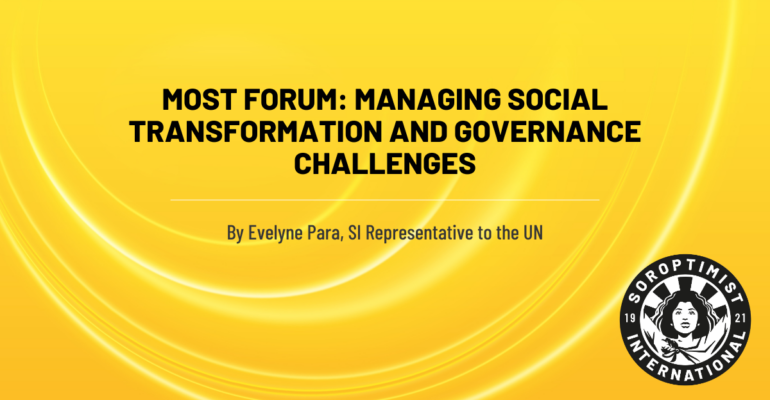Blog of Evelyne PARA, SI UN Representative at UNESCO.
On 17 and 18 June 2024, the 2nd Forum MOST (Management of Social Transformations) brought together at UNESCO Paris numerous representatives of Member States, academics and the business world, several NGOs and participants from civil society.

In a world facing unprecedented challenges related to inequality, digital transformation and climate change, the goal of the MOST Forum is to dissect these challenges, addressing the intricacies, obstacles and opportunities that emerge from global disruptions. This Global Forum emerges as a platform for thought leaders, policy makers and innovators from around the world to converge, deliberate and catalyse action. This annual gathering sits at the intersection of visionary thinking and pragmatic governance, bringing together thinkers who are shaping societal trends.
On the side lines of this Forum, round tables were also organised, for example on “The Price of Inaction: The Private, Fiscal and Social Costs of Children and Youth Missing Out on Learning Globally”, and also on the survey report on “Country Actions to Transform Education towards SDG4”.

I had the chance to take part in these very enriching meetings and round tables. In this blog, I tried to give you a summary of the key ideas.
Strengthening governance analytical capacities
The world is increasingly complex and dark. In many countries, democracy is in danger and there is a rise in radicalism everywhere. The difficulties encountered: demographic problems (increasingly older populations in some countries, youth bulge in other countries) leading to impacts on population mobility and migration, increase in inequalities related to education, housing, precariousness, increase in frustrations leading to radicalisation, disconnection between elites and citizens, loss of credibility of authorities, end of the period of strong global growth, questioning of globalisation and multilateralism, traditional divide between developed and developing countries, increase in conflicts, concerns of young people related to their loss of employability and climate change, etc.
Given these multiple difficulties raised during the MOST Forum, States are struggling to analyse situations and think strategically over the long term. International organisations are also unable to imagine sustainable solutions to manage the intersections between the 17 Sustainable Development Goals (SDGs), which are nevertheless linked to each other. All the speakers called for a Call to wake up, to rethink the methods of measurement and socio-economic indicators, to include collaborative and inclusive approaches, to listen attentively to the wishes of the populations, by integrating social justice, the foundation of our societies, as a priority at the heart of the reflections that allow us to build strategies and governance systems.

Considering desirable futures in the face of digital, economic and climate transitions
Speakers presented their talks, including Derek Walker, Wales’ Future Generations Commissioner, and Romina Boarini, Director for Wellbeing, Inclusion and Equality (WISE) at the Organisation for Economic Co-operation and Development (OECD), to advocate for effective governance requiring more than just implementing policies, but the development of compelling narratives that engage all stakeholders, inspire action and catalyse meaningful change.
Innovative frameworks for building more inclusive futures and multidisciplinary approaches were advocated, aiming to move away from dominant narratives and critically assess what it takes to inspire public trust and enable good governance. Visionary leaders, thinkers and innovators also explored transformative ideas for a “desirable future” that is not only inclusive and sustainable, but also rich in opportunities for future generations.
Two important Round Tables have clarified certain priorities:
The Price of inaction: The global private, fiscal and social costs of children and youth not learning
 At the 1st Round Table, the presentation of the results of a first study was conducted by UNESCO, OECD and the Commonwealth Secretariat. They provided evidence that accelerating economic and social development also requires accelerating investments in education and gender-transformative action. These findings highlight the monetary costs to economies around the world of leaving children and young people behind in education, but they also highlight non-monetary costs, such as those related to teenage pregnancy, corruption and crime.
At the 1st Round Table, the presentation of the results of a first study was conducted by UNESCO, OECD and the Commonwealth Secretariat. They provided evidence that accelerating economic and social development also requires accelerating investments in education and gender-transformative action. These findings highlight the monetary costs to economies around the world of leaving children and young people behind in education, but they also highlight non-monetary costs, such as those related to teenage pregnancy, corruption and crime.
Despite country efforts and progress, 128 million boys and 122 million girls are still out of school. Significant and persistent disparities and inequalities persist between and within countries. Even in high-income countries, a quarter of children lack basic skills. Skills gaps reach 94% in sub-Saharan Africa and 88% in South and West Asia, 74% in the Arab States and 64% in Latin America and the Caribbean.
Girls have more difficulty accessing education and are more likely than boys to not attend primary school. At the same time, boys are at greater risk of not learning when they are in school, of not progressing, of repeating a grade and of not completing their studies.
To know more, see the VIDEO
Transforming Education towards SDG4
At the 2nd Roundtable, several speakers shared talks of transformative actions in education, which encompass either small-scale or incremental improvements and larger, systematic changes that better align with the evolving needs of learners within a new social contract. These talks illustrated the prerequisites for optimising success for education transformation.
They also recalled the Calls to Action launched at the 2022 Education Transformation Summit, according to the 6 agreed axes:
- Gender equality and the empowerment of girls and women in and through education;
- Quality public digital learning for all;
- Green Education;
- Solving the education crisis;
- Education in crisis situations;
- Investing more, more equitably and more effectively.
To know more, see the full report.

